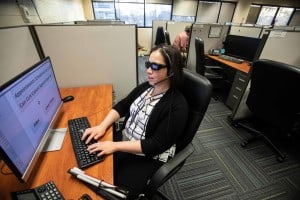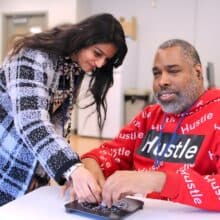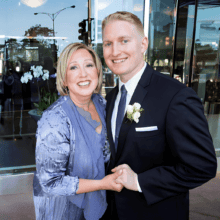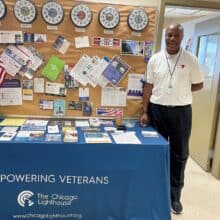Sandy’s View: Should I Disclose My Disability? Three Important Tips for People with Disabilities to Consider During the Job Seeking Process
A common dilemma job applicants with disabilities face is whether or not to disclose a disability during or after the hiring process. On one hand, disclosing a disability can better help employers understand why someone might need a given accommodation. However, people – particularly those with visible disabilities like blindness or physical impairments – might be concerned that employers will not hire them if they are aware about this fact. The concern is very valid, as many misconceptions still exist regarding workers with disabilities. I spoke with The Chicago Lighthouse’s Employment Services team, who shared some tips for job seekers to consider when choosing whether or not to disclose.

Tip #1: Disclosing is a personal choice.
Martha Younger-White, Senior Vice President of Employment and Rehabilitation Services at The Chicago Lighthouse, says they always tell clients that the decision to disclose is a very personal choice. The Americans with Disabilities Act prohibits employers from asking disability or health related questions, except in certain circumstances, such as if a position directly relates to someone’s experience with a disability or if having a disability is a qualification for the position. For this reason, it is important that job seekers know their rights so they can decide if and when to disclose their disability.
Tip #2: Focus on your skills!
If at any time in the hiring process you decide to disclose your disability, always emphasize your skills and what contributions you can bring to the job. Some individuals who are disabled immediately mention their disability in the resume or cover letter and express how their experience has led them to develop valuable skills. A person who is physically impaired might emphasize that having a disability has helped him or her become creative in coming up with multiple alternatives and solutions, for instance.
Tip #3: Be prepared for difficult questions or situations.
This is true for everyone, but individuals with disabilities sometimes encounter unusual situations that may be overlooked. It is not uncommon for people with disabilities to have extended gaps of time in their work history, for example. Things like dealing with medical issues or looking for employment after acquiring a disability are two common reasons why this happens. After reviewing your resume, a Hiring Manager might ask why there is a gap in your work history. This question might be unexpected and may lead you to disclose your disability. Rather than focusing on the fact that you have been unemployed, emphasize those activities that gave you valuable experience and knowledge that can help on the job. These include volunteer work or taking classes. Remember to always emphasize your skills and talents.
For some people with disabilities, it might be necessary to determine if the interview site is accessible or how they will get there several days prior to the appointment. Someone who uses a wheelchair will need to know if there is a ramp or elevator, while a person who is blind might need to know if he or she can get there using public transportation. Make sure to always research this ahead of time, ideally as soon as you know the interview date. Email or call to ask if there is an accessible entrance, nearby bus stops or train stations. This will help you better prepare for the day of the interview. Again, this might cause you to disclose your disability, but it will also show a prospective employer that you can effectively deal with these situations on the job.
Remember, deciding if or when you will disclose your disability is a very personal decision that is completely up to you. For that reason, it is critical that you know and understand your rights under the Americans with Disabilities Act. The Job Club lecture series presented by The Chicago Lighthouse Employment Services program is a great resource for job seekers with disabilities. In addition to discussing disability disclosure, this series also covers topics like resume and application preparation, interviewing skills, and other community resources. To learn more about Job Club or the Employment Services Program, email employmentservices@chicagolighthouse.org or call (312) 997-3659.
Are you a person with a disability? What other suggestions would you share with job seekers regarding disability disclosure? I would love to hear from you! Leave a comment on this post, or email sandysview@chicagolighthouse.org.





